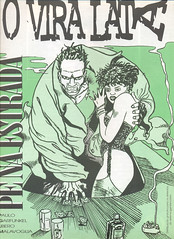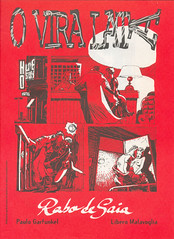
I'm digging through all the email that accumulated during DICE, and just found a news tip from a reader named Jason Ellis, who points out that he's got a list of black video game main characters going on his blog Microscopic. I'd already seen the list, because it was the subject of a little mini-controversy going on over at NeoGAF right now -- specifically over the fact that the poster girl of Ellis' piece is Jade, the main character of Beyond Good and Evil.
"Jade was black?""I always thought of Jade as an arab.""I always thought she was supposed to be of Eurasian descent.""I thought Jade was asian.""What? She don't look asian..more of a european for sure.""lol Jade is hispanic.""Jade looks a bit Greek to me.""I always figured she was Phillipino.""What??? Jade is clearly a latina!""I figured jade was at least half black but most likely fully blooded."
It's quite likely that the game's designers wanted Jade to be racially ambiguous, so that she would have just this effect. By which I do not mean "making people fight on message boards." I mean causing the player to see in Jade whatever they want to see, so as to better identify with her.
Jason Ellis is black, and he doesn't see Jade as being racially ambiguous -- he's quite sure that she is also black. I haven't spoken to any of the posters in the NeoGAF thread, but I wouldn't be shocked if a significant number of them saw themselves in Jade. Before this gets too sticky, let me say that this actually isn't a race issue at all. It's a subset of a widely held maxim about creating protagonists -- in any medium, but especially hand-crafted visual ones like comics, anime, and video games.
As Scott McCloud famously put it in his non-fiction comic-about-comics Understanding Comics, you want to design your main character to be as abstract as possible, if you want the reader to identify with him/her/it. If you add a whole lot of specific detail to your main character, you are just adding differences between him and the reader. To make the point, McCloud, who narrates Understanding Comics, draws himself in an abstracted manner. For one panel, he draws himself in ultra-realistic, heavily detailed style, asking the reader, "Would you be paying as much attention to me if I looked like this?"
The implication being, no.
So think about what that would mean if Jade was one hundred percent identifiably black, or Asian, or Greek. Again, this has little to nothing to do with racism. It's just as much to do with skin tone as it has to do with gender, hair color, eye color, height, weight, the size of a nose or the length of a fingernail.
It also has to do with voice, and what the character says. Note that while Jade isn't completely mute like Link from The Legend of Zelda, she never says anything particularly controversial or extensive -- it's the other characters in the game that do most of the talking, and have the strongest personalities.
The more details that define a character, the more you distance the player from it, and the less engaged the player becomes.
Ellis, a self-defined "activist", is writing this article to raise awareness; he speaks of the lack of black characters in video games as a problem that needs to be solved. "A friend in the game industry suggested that one reason is that there are very nearly zero black folks making games. That needs to change because, frankly, I'm pretty damn sure there are a good deal more than zero black folks playing games."
I imagine that more black protagonists have been suggested, but ultimately vetoed, for game projects for the very reasons that I'm talking about here -- that designers and marketers might worry that the (predominantly nonblack) video game audience might not buy a game with a black main character. The evidence doesn't really suggest that this is true, however -- look at the success of Grand Theft Auto San Andreas. And even though they're not very good games, I wouldn't faint from shock if I heard that most buyers of Shaq Fu and Michael Jordan's Chaos in the Windy City were suburbian white kids. I just don't think it's that big of a deal.
All this is to say that I think Ellis, even if he didn't realize it at the time, has suggested a very intriguing solution: video game protagonists whose race is so ambiguously defined that everyone, be they black, white, Filipino, or Greek, automatically, without even considering otherwise, comes up with their own answer.
"Jade was black?""I always thought of Jade as an arab.""I always thought she was supposed to be of Eurasian descent.""I thought Jade was asian.""What? She don't look asian..more of a european for sure.""lol Jade is hispanic.""Jade looks a bit Greek to me.""I always figured she was Phillipino.""What??? Jade is clearly a latina!""I figured jade was at least half black but most likely fully blooded."
It's quite likely that the game's designers wanted Jade to be racially ambiguous, so that she would have just this effect. By which I do not mean "making people fight on message boards." I mean causing the player to see in Jade whatever they want to see, so as to better identify with her.
Jason Ellis is black, and he doesn't see Jade as being racially ambiguous -- he's quite sure that she is also black. I haven't spoken to any of the posters in the NeoGAF thread, but I wouldn't be shocked if a significant number of them saw themselves in Jade. Before this gets too sticky, let me say that this actually isn't a race issue at all. It's a subset of a widely held maxim about creating protagonists -- in any medium, but especially hand-crafted visual ones like comics, anime, and video games.
As Scott McCloud famously put it in his non-fiction comic-about-comics Understanding Comics, you want to design your main character to be as abstract as possible, if you want the reader to identify with him/her/it. If you add a whole lot of specific detail to your main character, you are just adding differences between him and the reader. To make the point, McCloud, who narrates Understanding Comics, draws himself in an abstracted manner. For one panel, he draws himself in ultra-realistic, heavily detailed style, asking the reader, "Would you be paying as much attention to me if I looked like this?"
The implication being, no.
So think about what that would mean if Jade was one hundred percent identifiably black, or Asian, or Greek. Again, this has little to nothing to do with racism. It's just as much to do with skin tone as it has to do with gender, hair color, eye color, height, weight, the size of a nose or the length of a fingernail.
It also has to do with voice, and what the character says. Note that while Jade isn't completely mute like Link from The Legend of Zelda, she never says anything particularly controversial or extensive -- it's the other characters in the game that do most of the talking, and have the strongest personalities.
The more details that define a character, the more you distance the player from it, and the less engaged the player becomes.
Ellis, a self-defined "activist", is writing this article to raise awareness; he speaks of the lack of black characters in video games as a problem that needs to be solved. "A friend in the game industry suggested that one reason is that there are very nearly zero black folks making games. That needs to change because, frankly, I'm pretty damn sure there are a good deal more than zero black folks playing games."
I imagine that more black protagonists have been suggested, but ultimately vetoed, for game projects for the very reasons that I'm talking about here -- that designers and marketers might worry that the (predominantly nonblack) video game audience might not buy a game with a black main character. The evidence doesn't really suggest that this is true, however -- look at the success of Grand Theft Auto San Andreas. And even though they're not very good games, I wouldn't faint from shock if I heard that most buyers of Shaq Fu and Michael Jordan's Chaos in the Windy City were suburbian white kids. I just don't think it's that big of a deal.
All this is to say that I think Ellis, even if he didn't realize it at the time, has suggested a very intriguing solution: video game protagonists whose race is so ambiguously defined that everyone, be they black, white, Filipino, or Greek, automatically, without even considering otherwise, comes up with their own answer.


Nenhum comentário:
Postar um comentário